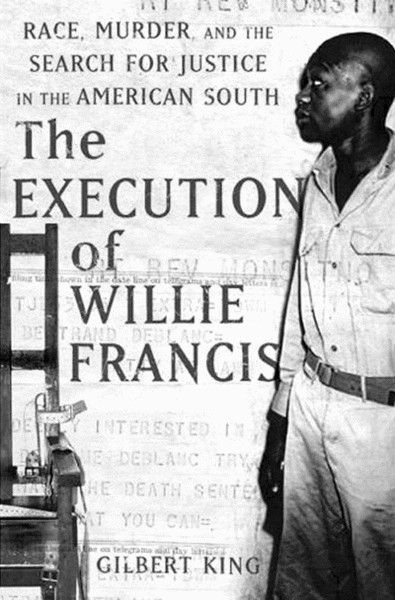The Execution of Willie Francis: Race, Murder, and the Search for Justice in the American South
Gilbert King
Basic Civitas, april 2008, $26
A search for justice in the American South suggests an arduous task. When the matter involves a black person, it may well be a fruitless one. Such is the message of Gilbert King’s expansive, engaging, and ultimately heartbreaking book.
Willie Francis was a 17-year-old negro with a yen for cowboy stories, chocolate bars, and the Good Book. But in 1946, Francis was known mainly as the killer of local pharmacist Andrew Thomas, which earned him a swift dispatch into heaven via an electric chair known as Gruesome Gertie.
Despite two jolts of 2,500 volts, however, Francis did not die. Either the Lord himself had stepped in, or the assigned executioners, still tipsy from carousing the night before, had botched the job. Now, the authorities of Martinsville, Louisiana, were puzzling how to proceed, even as national attention focused on this sleepy Cajun town.
The Schenectady-born King mines this curious tale for its attendant drama, exploring the harrowing highs and lows of a Jim Crow judicial system that was anything but color-blind. But lest the reader feel smugly superior to a cast of unrepentant bigots involved in a blatant miscarriage of justice, King reminds us that Francis himself confessed to the murder. (How and why he fatally shot the bachelor pharmacist remain murky details, although King has some provocative 11th-hour revelations.) The issue is not whether the teen is guilty, but whether, absurdly, another electrocution constitutes “cruel and unusual punishment.”
All but forgotten, the Francis case galvanized black communities across America and transfixed the media. King nimbly assesses the mounting controversy, summoning court transcripts, newspaper articles, private letters, and interviews. The story of the stuttering youth even nudged its way into popular culture. Hollywood stars Burgess Meredith and John Garfield, both crusading liberals, beseeched Louisiana Governor Jimmie Davis to reverse the boy’s sentence. Meanwhile, a pair of enterprising songwriters cashed in by penning a hit song titled “Da Lord Fool’d around Wid Dat Chair.”
Through impressive scholarship and the sure hand of a novelist, King brings to life the key players in this passion play. Among them: Bertrand LeBlanc, the white attorney who worked tirelessly for a year to rescue his client by alerting the world to the case; the determined A. P. Tureaud, a Creole attorney who hoped with this case to place the justice system itself on trial; Sheriff Gilbert Ozenne, a fancy dresser in a white suit and matching fedora whose taste for vigilante justice already had left several black men dead; even Supreme Court Justice Felix Frankfurter, who voted against saving Francis but then expressed a change of heart.
At the center of this hurricane is the condemned, an eerily quiet and self-contained man of faith. Discussing the possibility of being sent back to the chair, Francis calmly tells reporters, “Death and me is old neighbors. But remember this, I’m a closer neighbor of the Lord.”
The Execution of Willie Francis offers readers several rewards: a scorching history lesson, a thorough judicial examination, and a crash-course in Southern sociology—all while coolly reminding us of the knotty problems still surrounding capital punishment.















